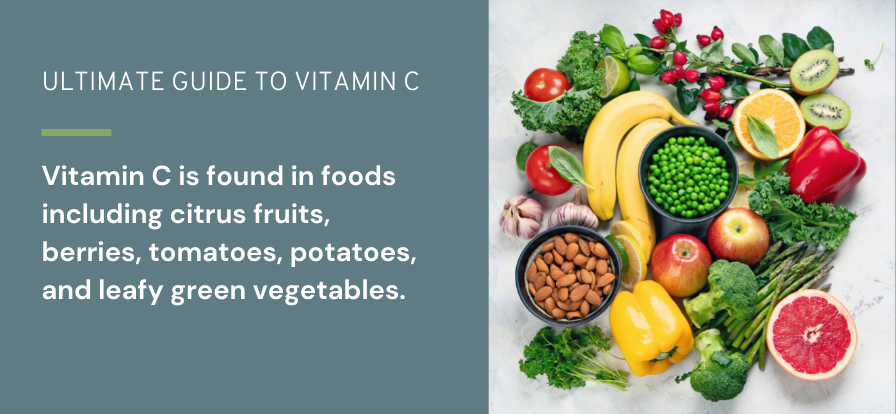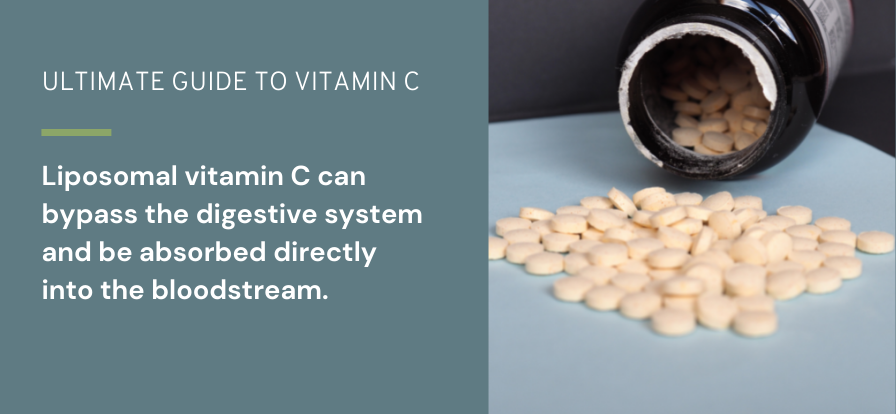Ultimate Guide to Vitamin C
Written by Stephanie Hodges, MS in Nutrition and Exercise Science, Edited by Martin Ebner, Sports nutrition specialist at Ebylife
Are you getting enough vitamin C in your daily diet? And why is that important? You’ve probably seen vitamin C in immune-boosting supplements and foods. Vitamin C is also prevalent in skincare products for its antioxidant and anti-aging properties.
It’s true that vitamin C plays a crucial role in keeping your body healthy–and also provides a boost for your skin.
In this blog post, we'll answer some of the big questions about vitamin C, including why you need it, where you can get it, and why you may want to consider taking a liposomal vitamin C supplement.
What Are the Benefits of Vitamin C?
Vitamin C, also known as ascorbic acid, is one of the essential vitamins for human health. It is a water-soluble vitamin involved in various vital processes in the body, including the formation of collagen, absorption of iron, neurotransmitter synthesis, and the proper functioning of the immune system.
Vitamin C is also an antioxidant, meaning it helps to protect cells from damage caused by free radicals. Free radicals are unstable molecules that can damage cellular DNA and lead to disease development. Vitamin C is also vital for healing wounds.
According to the National Institute of Health (NIH), studies have shown that a high intake of fruits and vegetables, and subsequently vitamin C, has the following benefits:
Reducing the risk of cardiovascular disease, including coronary heart disease risk.
Lowering the risk of stroke.
Reducing the incidence of the common cold.
Shortening the duration and severity of symptoms associated with the common cold.
It has also been suggested that vitamin C can diminish the risk or prevent age-related macular degeneration and cataracts, although studies have had mixed results.
What is the History of Vitamin C?
Scurvy is a disease resulting from vitamin C deficiency, a condition characterized by bleeding gums and eventual death. This disease was prevalent for centuries, especially among sailors who often died on long sea voyages. In the early 1800s, British sailors started receiving limes because it was found their juice was protective against this disease.
In the early 20th century, vitamin C was discovered by Hungarian physician Albert Szent-Györgyi. While studying the role of vitamin C in human health, Szent-Györgyi made some crucial observations. For example, he noticed that people who ate a diet rich in fruits and vegetables were less likely to develop scurvy.
He also found that ascorbic acid, a compound present in high levels in citrus fruits, could effectively treat scurvy. Along with research conducted by King and Haworth, Szent-Gyorgi’s critical findings resulted in a Nobel Prize in 1937.
How Much Vitamin C Should I Get Each Day?
The Recommended Dietary Allowance (RDA) for vitamin C is 90 mg/day for men and 75 mg/day for women. However, some experts believe that these levels are too low and that the RDA should be raised to 200 mg/day.
Smokers have an increased need for vitamin C and the NIH recommends that smokers consume an additional 35 mg/day. Pregnant women should also get more vitamin C, as it is essential for the development of the fetus. The RDAs for vitamin C during pregnancy and lactation are 85mg and 120 mg/day.
What Foods Are High in Vitamin C?
Vitamin C is found in foods including citrus fruits, berries, tomatoes, potatoes, and leafy green vegetables. Some people choose to get their daily dose of vitamin C from supplements, while others get it from foods. The top five food sources of vitamin C are:
Red bell pepper - 95 mg in ½ cup serving
Orange juice - 93 mg in ¾ cup serving
Orange - 70 mg in 1 medium
Grapefruit juice - 70 mg in ¾ cup
Kiwifruit - 64 mg in 1 medium
Related article: How to Combat the Nutritional Decline of Fruits and Vegetables
What Are The Signs You're Not Getting Enough Vitamin C?
Unfortunately, vitamin C is an easily depleted nutrient and a lack of vitamin C can lead to several different health problems.
Common signs of vitamin C deficiency include:
fatigue
weakness
sore and bleeding gums
dry and splitting hair
rough, dry, scaly skin
joint pain
weakened immune system
decreased wound healing
in extreme cases, scurvy
While most people get adequate vitamin C through their diet, those at risk for deficiency include smokers, people with chronic illnesses, and people who don't eat a well-balanced diet. Eating plenty of fruits and vegetables is the best way to ensure you're getting enough vitamin C.
Are There Risks of Taking Too Much Vitamin C?
While vitamin C is considered a safe nutrient with very few side effects, the tolerable upper limit for vitamin C is 2000 mg/day. Taking more than this amount can lead to gastrointestinal problems, such as diarrhea and nausea.
In addition, taking large doses of vitamin C can increase the risk of kidney stones. However, note that this only occurs in people predisposed to developing kidney stones.
If you are concerned about your vitamin C intake, talk to your doctor. They can help you determine whether you need to take supplements or make changes to your diet.
What is Liposomal Vitamin C?
Liposomal vitamin C is a supplement containing vitamin C encapsulated in liposomes. Liposomes are tiny bubbles made from phospholipids, a type of fat. The advantage of using liposomes to deliver vitamin C is that they can help the body absorb the nutrient more effectively. Because vitamin C is water-soluble, it can easily be flushed out of the body when taken in other forms.
Liposomal vitamin C can bypass the digestive system and be absorbed directly into the bloodstream. This allows for higher levels of the nutrient to reach the cells, where it can be used for various body functions.
Some research suggests that liposomal vitamin C may be especially beneficial in boosting immunity and helping to fight off infections. It may also offer other benefits, such as reducing inflammation, improving skin health, and protecting against heart disease.
What Should You Look for in a Vitamin C Supplement?
If you decide that you want to take a vitamin C supplement, there are a few things you should consider when choosing which one to take.
You want to select one that contains pure ascorbic acid. This is the form of vitamin C that is found naturally in foods.
You should also be sure to choose a supplement made with non-GMO ingredients and that does not contain any artificial additives. This will help to ensure you are getting the highest quality product possible.
Finally, look for a liposomal vitamin C supplement to enhance absorption. We recommend Amandean’s Liposomal Vitamin C liquid formula which meets all of these requirements and provides 1000 mg of vitamin C per dose.
In Summary
Vitamin C is an essential nutrient that offers a wide range of health benefits. Be sure to include plenty of vitamin C-rich foods in your diet. If you are a smoker, have a chronic disease or struggle to get your RDA from diet alone, you may want to consider supplementing with a high-quality Liposomal Vitamin C.
More articles you may enjoy:
References
https://pubmed.ncbi.nlm.nih.gov/23738385/
https://ods.od.nih.gov/factsheets/VitaminC-HealthProfessional/
Gropper, Sareen. “Water-Soluble Vitamins.” Advanced Nutrition and Human Metabolism, Seventh ed., Cengage Learning, Boston, MA, 2018, pp. 303–312.
Disclaimer
The content on our blog is created to inform, but should never be taken as professional medical advice. The content of our articles is not intended for use in the prevention, diagnosis, and/or treatment of any health complications. Before making any lifestyle changes that include diet, using supplements, or exercise regime, always consult your doctor or nearest health care specialist.
Some of our pages may contain affiliate links.




